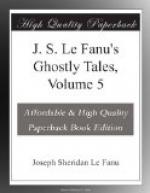“Sa bright ’twould blind ye to look at it,” said the girl.
“Never an ill sight but the deaul finds a light,” quoth the old woman. “There’s a rinnin brook thar—you were at this side, and they at that; did they try to mak ye cross over?”
“Agoy! didn’t they? Nowt but civility and kindness, though. But ye mun let me tell it my own way. They was talkin’ and laughin’, and eatin’, and drinkin’ out o’ long glasses and goud cups, seated on the grass, and music was playin’; and I keekin’ behind a bush at all the grand doin’s; and up they gits to dance; and says a tall fella I didna see afoore, ‘Ye mun step across, and dance wi’ a young lord that’s faan in luv wi’ thee, and that’s mysel’,’ and sure enow I keeked at him under my lashes and a conny lad he is, to my teyaste, though he be dressed in black, wi’ sword and sash, velvet twice as fine as they sells in the shop at Gouden Friars; and keekin’ at me again fra the corners o’ his een. And the same fella telt me he was mad in luv wi’ me, and his fadder was there, and his sister, and they came all the way from Catstean Castle to see me that night; and that’s t’ other side o’ Gouden Friars.”
“Come, lass, yer no mafflin; tell me true. What was he like? Was his feyace grimed wi’ sut? a tall fella wi’ wide shouthers, and lukt like an ill-thing, wi’ black clothes amaist in rags?”
“His feyace was long, but weel-faured, and darker nor a gipsy; and his clothes were black and grand, and made o’ velvet, and he said he was the young lord himsel’; and he lukt like it.”
“That will be the same fella I sid at Deadman’s Grike,” said Mall Carke, with an anxious frown.
“Hoot, mudder! how cud that be?” cried the lass, with a toss of her pretty head and a smile of scorn. But the fortune-teller made no answer, and the girl went on with her story.
“When they began to dance,” continued Laura Silver Bell, “he urged me again, but I wudna step o’er; ’twas partly pride, coz I wasna dressed fine enough, and partly contrairiness, or something, but gaa I wudna, not a fut. No but I more nor half wished it a’ the time.”
“Weel for thee thou dudstna cross the brook.”
“Hoity-toity, why not?”
“Keep at heyame after nightfall, and don’t ye be walking by yersel’ by daylight or any light lang lonesome ways, till after ye’re baptised,” said Mall Carke.
“I’m like to be married first.”
“Tak care that marriage won’t hang i’ the bell-ropes,” said Mother Carke.
“Leave me alane for that. The young lord said he was maist daft wi’ luv o’ me. He wanted to gie me a conny ring wi’ a beautiful stone in it. But, drat it, I was sic an awpy I wudna tak it, and he a young lord!”
“Lord, indeed! are ye daft or dreamin’? Those fine folk, what were they? I’ll tell ye. Dobies and fairies; and if ye don’t du as yer bid, they’ll tak ye, and ye’ll never git out o’ their hands again while grass grows,” said the old woman grimly.




